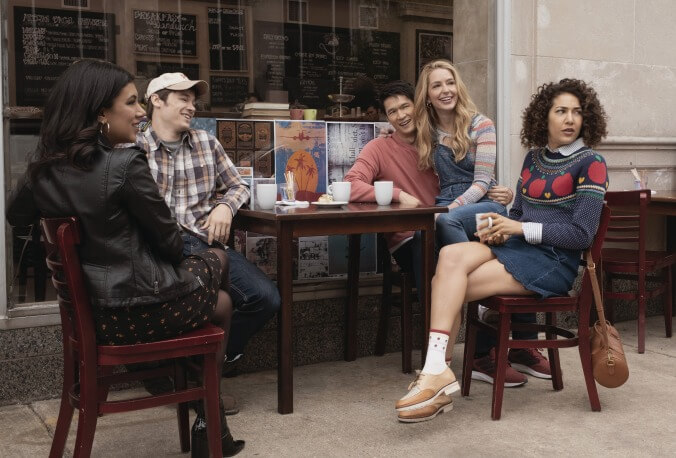Hackneyed tearjerker All My Life plays like an adaptation of a “Live, Laugh, Love” sign

Note: The writer of this review watched All My Life on a digital screener from home. Before making the decision to see it—or any other film—in a movie theater, please consider the health risks involved. Here’s an interview on the matter with scientific experts.
Though loosely based on true events (a quick Google search reveals facts that have been toyed with fast and loosely), All My Life may as well have found its source material in the décor aisle of a Target. This dreadfully lackluster terminal-illness romance from first-time feature screenwriter Todd Rosenberg and director Marc Meyers (My Friend Dahmer) begins with an opening monologue that announces its shallow guiding mantra: “Now or Never”—as in, stop waiting to take a chance on your dreams! This will be a film with all the philosophical substance of an inspirational Facebook chain post.
After meeting unremarkably in a sports bar, Jen (Happy Death Day’s Jessica Rothe) and Sol (Harry Shum Jr. from Crazy Rich Asians) fall for each other. The future seems bright for the two: Bored with his marketing job, Sol quits to work as a chef in the chic restaurant owned by Jen’s cousin. The lovebirds then move into Jen’s spacious and catalogue-ready apartment. (So that’s where the $25 million budget went.) But then Sol gets a dire diagnosis: He has an aggressive strain of liver cancer. Vowing to fight it together, the two rush to get married (a GoFundMe campaign comes to the rescue), cueing montages, a few generic arguments, and a dreamlike party. (Most of this is in the unnecessarily detailed trailer, so no spoilers here.)
Sol and Jen’s quick-evolving and platitude-heavy relationship unfolds inside a hipster utopia so devoid of realism it’s basically an adult Sesame Street. Everyone knows everyone, and every aspect of life, no matter how painful, is Instagrammable. There’s a farmers market with organic produce and artisanal crafts, a watering hole that reeks of gentrification, and a stylish coffee shop that’s also, of course, a vinyl and vintage clothing retailer. The singing barista, the down-to-earth bartender, and the brawny food-truck owner at each of those locations are close pals with the couple, as it turns out. Sol’s YouTube-friendly marriage proposal is what brings them all together.
Most of these friends lack even the slightest hint of an inner life—they are placeholders rather than characters, present only to drive the plot forward. Even the usually entertaining Jay Pharoah fades into the background. Kyle (Kyle Allen), one of the groom’s closest buds, earns the default title of most complex person on screen, mostly by virtue of a backstory related to his father’s death and the PTSD caused by seeing Sol in similar circumstances. But Kyle disappears for large chunks of the running time, which is too bad, as he’s more interesting than our pair of protagonists. (The up-and-comer leads proficiently phone in the emotions throughout.)
All My Life operates under the assumption that someone battling cancer is inherently interesting, regardless of who that someone is or if anyone on screen has any dimension whatsoever. Say what you will about the religious variations on this subgenre of doomed lovers making the best of their final days together, but at least those films commit to their militant agenda and swing for the fences of guilt and redemption. Likewise, the average adaptation of a YA cancer novel shoves pathos so far down the throat that even the most reluctant crier might force back a stray tear or two. No such danger here: All My Life is too passionless to earn even a begrudged sniffle. It’s all paint-by-numbers, from the requisite “screaming inside a car” shot expressing a character’s frustrations to the store-bought spontaneity of a couple jumping into a fountain fully clothed.
Faced with such a bland tearjerker, the mind turns to glaringly unexplained elements, like why no one from Sol’s family attends the wedding or even seems to get notified about his condition. Is he an orphan? Or were some of the real people from this real story excised, for legal or resentment-based reasons? Whatever drew him to the project, all of this feels like a demotion for Meyers, whose film about infamous serial killer Jeffrey Dahmer was marvelously ambivalent. Here he’s made a movie so artificial in its sheen that it could have been orchestrated by an executive in a remote office instead of by a director on a set. Halfway through the film, right before Sol and Jen’s circumstances take a turn for the maudlin, one of her friends refers to a workout session as “a 90-minute voluntary torture.” But enough about All My Life.